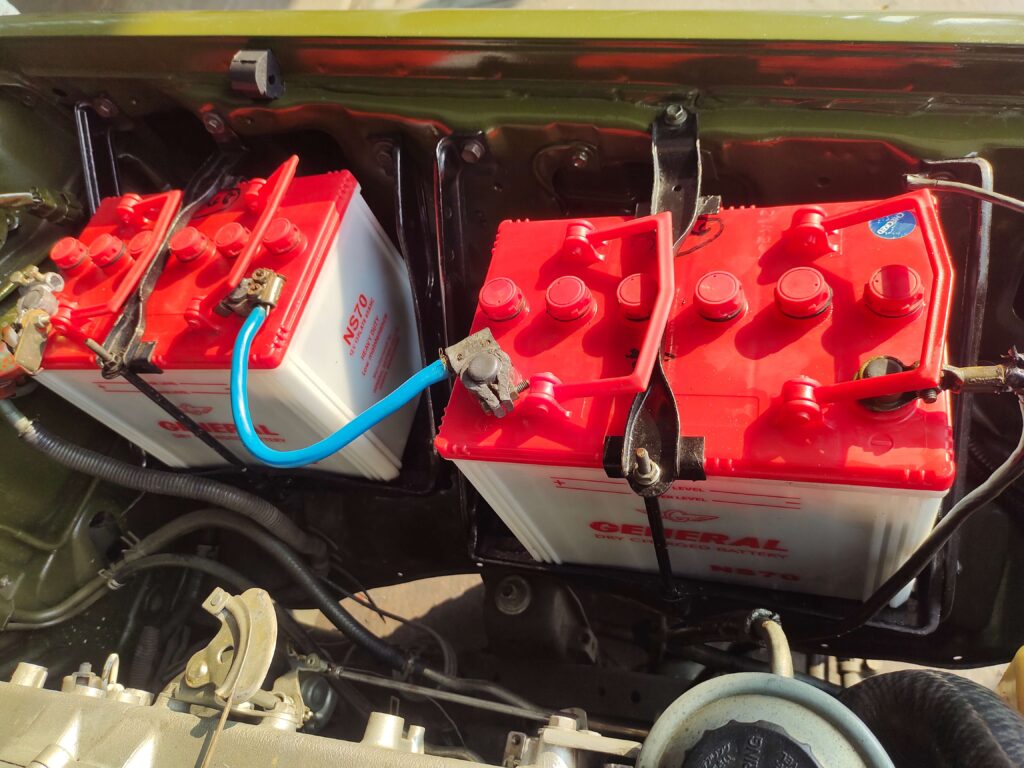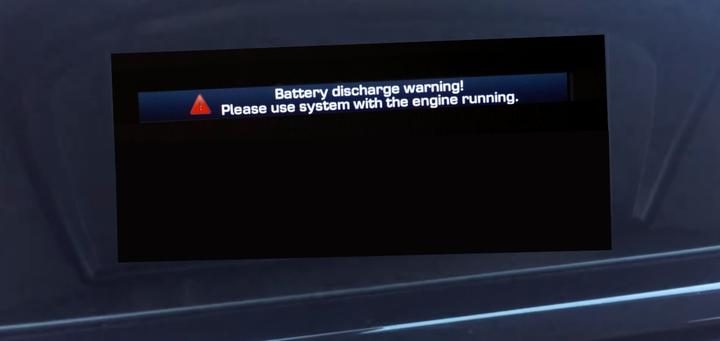Hi, I'm Luis Johnson, an automobile technician, and power equipment professional. By profession, I'm a businessman and operate a car workshop. I have created this...Read more
If you’re driving a vehicle and your battery is low, you might see a little light flashing on the dashboard, or maybe a warning message pops up on your screen saying “battery discharge alert” or something similar. But what does a battery discharge warning mean?
In short, it means your car’s battery is draining quicker than it’s charging, signaling an imminent electrical problem. The discharge of a battery can cause fatal consequences, signaling a more threatening problem; such as a dying alternator.
Let’s explore this problem a little further, what causes it, the consequences, and see what you can do to obtain a quick resolution.
What Does Battery Discharge Warning Mean?
Vehicles with battery discharge alarms show that the battery is draining more quickly than it is charging, indicating the imminent arrival of an electrical issue. You will see this alert on the screen of your car, the multimedia panel, or the dashboard display.

If your automobile is still consuming energy after the motor has been turned off, then a battery discharge alarm will display on the screen. You could see this warning while you’re driving, alerting you to the possibility of a more serious problem.
A discharged battery can lead to severe repercussions, indicating a problem of greater severity.
For example, when an alternator fails, it can no longer generate the electricity needed to recharge the battery. This can cause a domino effect of sorts, whereby the failed alternator leads to a discharged battery, which can then cause the engine to fail.
Read Also: Do You Have To Replace Battery When Replacing Alternator?
Consequences of A Discharged Battery
As we’ve mentioned, a discharged battery can have some pretty severe consequences. The worst-case scenario is, of course, that your car’s engine fails while you’re driving. This can be incredibly dangerous, especially if you’re on the highway.
But even if your engine doesn’t fail, a discharged battery can cause all sorts of electrical problems. Such as-
- Slow engine cranking
- Sudden engine stalling
- A complete loss of electrical power
- Inoperable components and accessories
- Lights out
- Damaged electrical connections
- Data loss in infotainment systems
Moreover, a dead battery can leave you stranded. If you’re in the middle of nowhere when your battery dies, you could be in for a long walk (or a very expensive tow truck ride).
What Causes the Battery Discharge Warning During a Stop?

Your car’s battery may discharge if you leave it off. An alternator not charging your battery leads to this problem. Thus, you are left with only one power source: your battery. Here are a few factors that may cause your car’s battery to go uncharged without power.
Loose Battery Terminals
Loose connections are often the main culprit behind a battery dying. And despite your vehicle at a stop, the terminals may work themselves loose, causing a loss in connection and power.
You can check the terminals by looking for any corrosion. If the corrosion is heavy, you can use a wire brush to clean them. Take extra caution not to damage the terminals.
Outdated Battery
As a battery nears the end of its life, it becomes less effective at holding a charge. It might be time for a new battery if you’ve had your vehicle for a while and haven’t changed the battery.
Failed Alternator
The alternator is what charges your battery while the engine is running. If it fails, your battery will slowly discharge as it tries to power everything on its own. This can cause your engine to fail eventually as well.
Radio and other Accessories
Leaving your radio or other accessories on while the engine is off can slowly drain your battery. If you do this often while your engine isn’t running, it will shorten the life of your battery significantly.
Adverse Weather Conditions
Cold weather can have a significant impact on your battery’s performance. Batteries work less effectively in the cold and are more likely to fail. If you live in a cold climate, it’s important to have your battery tested regularly to ensure it is still working properly.
Climate Control
If you have your climate control set to a high temperature while the engine is off, it can put a strain on your battery. The compressor puts a lot of strain on the battery, and if it’s already weak, it can cause it to fail.
Left-On Headlights
Leaving your headlights on is one of the quickest ways to drain a battery. When you do this a lot, it will cause your battery to die much quicker than it should.
Plugged-in Chargers
Leaving your phone or other device plugged into a charger while the engine is off can also drain your battery. If you must leave it plugged in, make sure the charger is disconnected from the power source.
Parasitic Drainage
A parasitic drain is when your battery is slowly drained even when the car is turned off. This can be caused by your windshield wipers, a door light, an electrically heated seat, electronic steering, or another electrical issue. If you suspect a parasitic drain, have your car checked by a mechanic.
What Causes the Battery Discharge Warning Signal While Driving?
Your car battery is unlikely to discharge when the engine is running. Yet, you can’t always rule out the slightest possibility. In the following situations, a battery discharge warning indicator could show while you’re driving.

Weak Battery
The most frequent cause of a battery discharge alert while driving is a weak battery. As the battery weakens, it becomes less effective at holding a charge. This can cause the battery to die while the engine is running.
Failed Alternator
If your car’s alternator fails, it will no longer charge your battery. This can cause the battery to slowly discharge as it tries to power everything on its own. If the battery dies while the engine is running, it can cause your car to stall.
Worn Serpentine Belt
If your serpentine belt is worn, it can cause the alternator to spin slower than usual. This can lead to an interrupted, slipped, or weak charge being sent to the battery, causing it to slowly discharge.
Corrosion on the Battery Terminals
Corrosion on the battery terminals can prevent the electrical current from flowing freely between the battery and the car. This can result in the battery slowly depleting.
Bad Charging Circuit
If there is an issue with the charging circuit, for instance, a loose connection, it can prevent the battery from charging properly. This can cause the battery to slowly discharge while the engine is running.
Poor Ground Connection
A poor ground connection can result from corrosion or a loose connection. This can cause the battery to slowly discharge as it tries to power everything on its own.
Corrosion on the Battery Terminals
Corrosion on the battery terminals can prevent the electrical current from flowing freely between the battery and the car. This can result in the battery slowly depleting.
Shorter Trips
If you frequently go on quick excursions, it’s possible that your car won’t have enough time to fully charge the battery. Over time, this can cause the battery to decay slowly and eventually die.
How to Fix Battery Discharge Warning?
There are a few things you may do to fix your car’s battery if you think it may be losing charge. Here are some procedures for restoring batteries after discharge.
- Check the Electrolyte: The initial and most critical step is to look at the electrolyte values. Chances are you haven’t checked your battery’s electrolytes for months now. As the electrolyte depletes, your vehicle cannot start since it is unable to distribute current due to a lack of electrolyte.
- Jumpstart: Often, reviving a depleted battery can be as simple as jump-starting it. If your battery is weak, connect it to a stronger battery using jumper cables. Your car will probably start, and the alternator will charge your battery as a result.
- Recharge: If nothing else works, your battery might need to be externally charged. You’ll find various external power chargers online or at your nearest stores. As an alternative, you might pay $10–$20 to get it recharged at a battery shop.
- Battery Replacement: If all else fails, replacing the battery is your last resort. When your car runs but the battery dies, even after taking all the above steps, you’ll need a new battery.
Frequently Asked Questions
Below, we have compiled a list of frequently asked questions and answers about battery discharge warnings.
How Do I Know if My Car Battery Is Dying While Driving?
Several signs can indicate your car battery is dying while driving. These include dimmed headlights, electric accessories not working, and the engine stalling.
What Does It Mean When A Battery Discharges Rapidly?
A battery discharge is considered rapid when it occurs within a short period, such as overnight. This can be caused by leaving the headlights or other accessories on, or by a problem with the charging system.
What Is the Life Expectancy of A Car Battery?
It depends. The average lifespan of a car battery is 4-5 years, but this can vary depending on the make and model of your vehicle, your driving habits, and the climate.
How Long Should It Take to Discharge a Battery?
Batteries typically lose one-third of their capacity before they are deemed discharged. Therefore, it should take about three hours to discharge a battery.
Is It Safe to Drive with A Discharged Battery?
While it’s technically possible to drive with a discharged battery, it is not recommended. A battery that is significantly discharged can cause damage to the electrical system and may lead to a breakdown.
Is the Car’s Battery Charged While It Is Idling?
No, the battery does not charge while idling. The alternator only charges the battery when the engine is running above idle speed. However, if the battery is already charged, idling will help maintain the charge.
How to Check if The Car Battery Is Still Good?
To check the voltage of the battery, use a multimeter. A battery should be at least 12.6 volts in voltage when it is fully charged. If the voltage is less than 10 volts, it must be recharged. And, If the voltage is less than 6 volts, it must also be changed.
Conclusion
It is important to take a battery discharge warning seriously. In most cases, this warning is emitted to alert the driver of a potentially dangerous problem. When your battery’s ability to hold a charge is compromised, this might be a sign of more serious electrical problems within the car.
So, don’t ignore the warning and take the chance that your car’s electrical components will fail while driving down the road. Have your vehicle checked immediately, or at the very least know what you’re looking for when visiting your mechanic.

Hi, I'm Luis Johnson, an automobile technician, and power equipment professional. By profession, I'm a businessman and operate a car workshop. I have created this site Batteryquery to help people purchase the right battery for their vehicles. The reason behind creating this site is to help my customers purchase the right car battery who often purchase the wrong one due to their lack of knowledge.
More Posts